As I was finishing up writing about some of the heavy books I wrote about last time — and thinking about the ones I did before that — I grabbed some brand new books from our new book table that are less directly about the brokenness of our culture, the theological demands of public life, that might be helpful or even fun reading for the dog days of August. I hate to call them self-help books or spiritual formation, exactly, although some are sort of that. Some are, shall we say, a bit less demanding, maybe more personally engaging and encouraging. They are each really, really good.
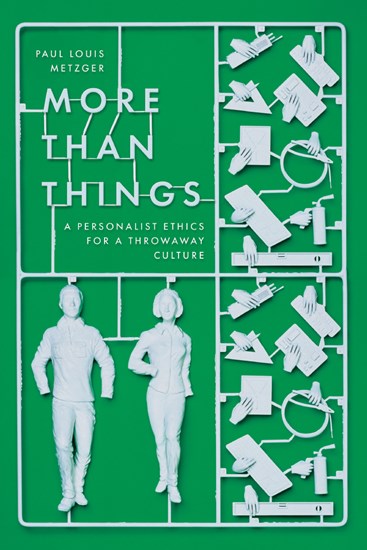 Big thanks to those who ordered books from the last few BookNotes. Don’t forget that we will continue to promote the extraordinary (if fairly scholarly and complex) new work by Paul Louis Metzger, the fabulous More Than Things: A Personalist Ethics for a Throwaway Culture (IVP Academic) in an on-line event on August 17th. If anybody can make a national Zoom event personal, I’d like to think Paul and I can. We’ll laugh some, chat some, maybe argue some, tell some tender stories, and take questions through the miracle of modern on-line technology. Paul is a great on-the-fly conversationalist and the hour will zoom by. I’ll send out a pre-registration link soon. See my previous review here if you missed it. Even if you haven’t bought the book please plan to join us at 1:00 PM (EST) on the 17th.
Big thanks to those who ordered books from the last few BookNotes. Don’t forget that we will continue to promote the extraordinary (if fairly scholarly and complex) new work by Paul Louis Metzger, the fabulous More Than Things: A Personalist Ethics for a Throwaway Culture (IVP Academic) in an on-line event on August 17th. If anybody can make a national Zoom event personal, I’d like to think Paul and I can. We’ll laugh some, chat some, maybe argue some, tell some tender stories, and take questions through the miracle of modern on-line technology. Paul is a great on-the-fly conversationalist and the hour will zoom by. I’ll send out a pre-registration link soon. See my previous review here if you missed it. Even if you haven’t bought the book please plan to join us at 1:00 PM (EST) on the 17th.
For now, though, here’s a fresh BookNotes column that offers something a bit other than analyzing culture and doing socially-engaged theology. We offer 10 new books for your summer reading that offer insights about personal growth. These are really great, and we’d be glad to send some out now. Plus — hooray! — one to pre-order that is not out yet.
If you order the forthcoming The Deepest Place by Curt Thompson [see below] along with any other items, be sure to tell us if you want us to hold those we have while we wait for the not-yet-released one, or if you want us to send some now, and that one later, when it arrives, later in the month.
TEN NEW BOOKS FOR PERSONAL GROWTH AND WHOLENESS + ONE TO PRE-ORDER
 Wake Up to Wonder: 22 Invitations to Amazement in the Everyday Karen Wright Marsh (Brazos Press) $19.99 OUR SALE PRICE = $15.99
Wake Up to Wonder: 22 Invitations to Amazement in the Everyday Karen Wright Marsh (Brazos Press) $19.99 OUR SALE PRICE = $15.99
If this doesn’t end up on many year’s end best books lists, something is wrong out there. It is utterly delightful, challenging, interesting, informative, glorious, useful. It offers “a life of spiritual depth, amazement, and connection” which, they say, is “within reach — today and everyday.” Okay, that may be a bit of a big promise, but they are on to something here: in our quest to live a vibrant spiritual life, we need, as Karen puts it, “not to follow the perfect plan but people that we could follow.” This approach is grounded in the sensibly Biblical embodied sort of spirituality. This book offers twenty-two playful, simple practices that bring deeper meaning and purpose to everyday life.
You may recall Karen Marsh’s remarkable book Vintage Saints and Sinners: 25 Christians Who Transformed My Faith (that nicely sits next to books like Soul Survivor: How Thirteen Unlikely Mentors Helped My Faith Survive the Church by Philip Yancey.) It’s a fabulously designed and wonderfully written hardback that I can’t say enough about.
This new one is similar insofar as it offers mentors and guides, faithful followers who have something to model or teach. The big difference, it seems, is that Wake Up To Wonder has a bit of a lighter touch, inviting us to gap and glory in amazement. It invites us to abundance, truly. (It covers topics as diverse as physical health and prayer, activism and Scripture study, creativity and enjoying nature.) Each brief look at a saint — from Dorothy Day’s delight in a day at the beach to Howard Thurman’s learning to “take a pause” to Martin Luther’s habit of “singing out loud” to Henri Nouwen’s advice of “putting pen to paper” — not only offers a specific practice, but she has ingenious and creative application prompts to help you ponder and pursue it, engaging, as they say. There are personal experiments anyone can do, and you can start this summer. Highly recommended, for reading pleasure, for deepening faith, for waking to wonder.
There are delightful and compelling blurbs on the back that are convincing. Not every book has a rave from The Most Rev. Michael Curry (presiding Bishop of the Episcopal Church) and rock and roller of Switchfoot fame, Jon Foreman, next o James Martin, the popular (and funny) Jesuit, who calls the new book “beautiful.”
I was surprised by how much I needed the spiritual sustenance that Wake Up to Wonder offers. Marsh invites us to nurture our own wellsprings of wonder. — Barbara Homes, Joy Unspeakable: Contemplative Practices of the Black Church
 Stewarding Our Bodies: A Vision for Christian Student Affairs edited by Penny Glazer & Austin Smith (Abilene Christian University Press) $24.99 OUR SALE PRICE = $19.99
Stewarding Our Bodies: A Vision for Christian Student Affairs edited by Penny Glazer & Austin Smith (Abilene Christian University Press) $24.99 OUR SALE PRICE = $19.99
This is a book that, while designed for student affairs professionals, campus ministers, and others who work with young adults, is so admirably wise and interesting, that I want to promote it here for all Hearts & Minds friends. Yes, numerous issues related to the body seem to nearly plague those in higher education, so this is going to be helpful for any college educator or college kid you know. (Just think — or ask them if you think I’m overstating it — how students struggle with sleep, mental health, eating disorders, sexual identity questions, clothing choices, concerns about body image, alcohol problems and on and on…)
However, this book, written by students and faculty and staff at faith-based institutions, offers more than simple bromide or self help advice they can get from a quick google search. No, it is a one-of-a-kind blessed bit of serious research on a theological framework for such concerns related to embodiment in the real world (these days.)
Each chapter is on a different topic related to bodily life and, while drawing on the expertise and experiences of researchers and practitioners (mostly within the setting of Christian colleges, but not exclusively so), each offers a great bit of tender, wise insight.
There are chapters that themselves are nearly worth the price of the book, offering desperately needed guidance for a uniquely Christian perspective on navigating these topics. Agree or not with the details, this framework is one-of-a- kind and we are pleased to recommend it widely.
These include (among others) great, thoughtful, chapters such as:
- Savoring and Stewarding Food by Lisa Graham McMinn
- Stewarding Our Limitations: Receiving GOd’s Gift of Sleep by Lisa Igam
- Sabbath Taking by Justin Whitmel Earley
- Attuning and Attending: Exercise and the Body by Andrew Borror
There are fabulous pieces on fashion (by the amazing Robert Covolo who is the pioneering thinker on this topic) and social media by the brilliantly astute Felcia Wu Son. There are several pieces on sexuality, sexuality identity, and one on pornography use (intriguingly called “Sex with a Person’s Mediated Body.”) As you’d expect there are several helpful chapters about anxiety, about depression, about mental health.
Stewarding Our Bodies is a must-have resource for anyone who works in higher education, and, I think, good for any youth pastor. Naturally, with a bit of understanding of its context, it would be great for nearly any seriously Christian young adult.
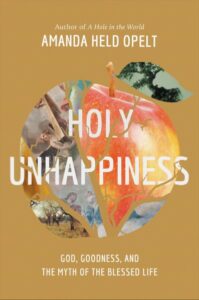 Holy Unhappiness: God’s Goodness, and the Myth of the Blessed Life Amanda Held Opelt (Worthy Publishing) $27.00 OUR SALE PRICE = $21.60
Holy Unhappiness: God’s Goodness, and the Myth of the Blessed Life Amanda Held Opelt (Worthy Publishing) $27.00 OUR SALE PRICE = $21.60
Okay, friends, this is an amazing new book and I am only part way through, but can’t wait to tell you just a bit about it. It deserves a more thorough review, but for now I can alert you to what is going to be, I trust, an enduring work, maybe someday considered a classic. It is so nicely written, accessible, interesting, fun, even as it is about a somewhat dour topic: why aren’t we happy and, more importantly, why do we expect to be. Ha. What a thesis!
You may know Amanda Held Opelt, who wrote the marvelous (I’m not kidding you — a marvelously interesting and edifying) book on grief practices from around the country, around the world, even. That one was called A Hole in the World: Finding Hope in Rituals of Grief and Healing (we just got the paperback edition) and I was blown away by how good it was.
This one illustrates that Ms Opelt is a very good writer and a thoughtful, balanced, insightful thinker. It is a gift that she shares her concerns with such vulnerability — it isn’t a highbrow research tome or a heady theological discourse. It reads like an engaging memoir as she tells her story of being, shall we say, restless. And why and how she came to be at peace with that.
Two wonderful pieces early in the book captivated me. First, she is so very candid about how she has had a pretty good life, easy by global standards, and, despite the horrible sudden loss of her beloved sister, Rachel, she mostly feels pretty blessed, privileged, even. This recounting of her station in life was so refreshing and won me over that she has a perspective that is rather different than so many self-help books. This is not, she says, a heartbreaking epiphany, being sent “on a journey of self-discovery and rebirth. My unhappiness did not descend on me like some grand revelation. It has been more like a slow drip of disappointment.”
She notes:
It feels like a lack, almost as if I am expecting something out of life that has not yet been delivered. Sometimes the sadness looms large, feels like a boulder I’m carrying. Sometimes it’s as small as a pebble in my shoe. But it is always there, pressing painfully at every step.
She says this is not depression, really, or clinical anxiety. It’s like an “ever-present anticlimax.”
Can you relate, this sense that somehow life has let you down?
Here’s the second big thing: she relates our expectations about what we think we should get out of life from what she calls a “emotional property gospel.” Most of us have heard, and most have rejected, the prosperity gospel promising health and wealth. She, too, has been a part of churches that firmly oppose such heretical nonsense. Yet — and it is a big yet — much of the air many Christians believe in solid and robust churches, is a sense that, emotionally, our callings and vocations and faith and service should bring us some sort of extraordinary feeling of well-being.
Opelt links this to the New Thought movement that swept America in the late 1800s and which resurfaced within Pentecostalism, and then, again, in the Eastern-ish New Age movement. (Yes she nicely draws on Blessed, the academic study of this by Kate Bowler.) Her cultural analysis is not tediously detailed but she has clearly done some very important research that has shaped how she understands our times, her quandary, and how she tells her story. It’s really interesting!
Amanda has worked in the third world and knows well what real deprivation looks like. She worries that even telling this story might be off-putting. She says she “feels the cringe-worthiness of all this even as I type it.” I am grateful that she says this, and how she observes that it is confusing, even to her.
But it is a story that must be told — why do our very blessed lives not often feel like a blessing? It is a matter, I think, that a simple gratitude journal will not fully solve. Her insights about the concept of blessedness (which “has a long and storied history, particularly within religious circles”) make this an informative study, even as it reads like an honest memoir.
There are three main parts to the book and after the three chapters in each of these sections she offers an interlude which she calls, not ironically, a blessing. These “blessing” readings include good, good words on delight, on humility, and on hope. My, my, this is beautiful, rich, honest, good stuff. Just what I needed. You, too, maybe?
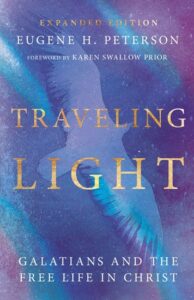 Traveling Light: Galatians and the Free Life in Christ Eugene Peterson (IVP) $25.00 OUR SALE PRICE = $20.00
Traveling Light: Galatians and the Free Life in Christ Eugene Peterson (IVP) $25.00 OUR SALE PRICE = $20.00
This newly expanded edition of an early book of Peterson is a joy to this old bookseller’s heart and, as a friend and fan of Eugene, it nearly brings tears to my eyes to tell you about it. As I hold this book in my hand — expanded, a handsome, demure cover, a great new forward by Karen Swallow Prior, a new subtitle — I think of the early 1980s first one. It had cool hot air balloons on the cover, and when it too soon began to look dated, I wished and prayed that IVP would reissue it. I’m glad they finally did.
A late dear friend named Mark, who died too early, often told me this was a life-changing, favorite book for him. I argued that A Long Obedience in the Same Direction and its sequel, then called Earth and Altar, (now known as Where Your Treasure Is: Psalms That Summon You from Self to Community) were stronger, but Mark insisted that Traveling Light was genius, the one that clicked for him. As a graphic designer, he didn’t love the happy hot air balloon cover, and eventually got the rare second edition with the Marc Chagall painting on the cover. I wish he was around to see this new one.
It is, as the new subtitle conveys, a study of Galatians. That was one of the early studies that Peterson did in his church basement as he mimeographed his paraphrases, now famously released as The Message Bible. This, my friends, in a way, started it all. Peterson wrote a few other books before this, and, indeed, Long Obedience remains a most beloved classic. But his study of the freedom we have in Christ, the down-to-Earth, gritty sort of fidelity found in knowing grace and loving well, this freedom from fear — it is foundational. Ground zero for Pastor Pete, I’d say.
Karen offers in her tremendous preface a page on one of Peterson’s favorite poets, Gerard Manley Hopkins. She says that “Peterson’s approach to freedom in Christ reflects what Hopkins expresses in “The Windhover.” She invites us to read it and re-read it. To read it aloud and read it yet again. Eugene would have liked that, believe me.
Listen to what my friend Winn Collier wrote about it:
Eugene Peterson wrote Traveling Light amid a time of cultural upheaval. This was his Scripture-saturated response to his profound concern for how Christians were growing distrustful of their neighbors, taking on tribal identities, withdrawing from the world’s pain, and holding more loyalty to some vision of America than to the kingdom of God. Eugene believed we were consumed by a constricting, heart-gripping fear–and that we were desperate for a fresh encounter with God’s liberating freedom. Apparently, Eugene was also writing for us, right now. — Winn Collier, author of A Burning in My Bones: The Authorized Biography of Eugene H. Peterson and director of the Eugene Peterson Center for Christian Imagination
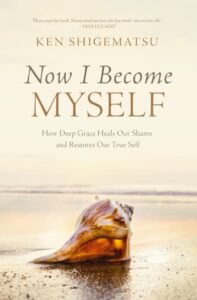 Now I Become Myself: How Deep Grace Heals Our Shame and Restores Our True Self Ken Shigematsu (Zondervan) $19.99 OUR SALE PRICE = $15.99
Now I Become Myself: How Deep Grace Heals Our Shame and Restores Our True Self Ken Shigematsu (Zondervan) $19.99 OUR SALE PRICE = $15.99
Ken Shigematsu is an author I’ve reviewed before here, highlighting just how wise and right he is about so much, and what a good writer he is. He is not deeply mystical or arcane in his contemplative lifestyle, even though he stands pretty squarely in that tradition. He was a fast-paced, high-profile international business exec who found, nearing burnout, a deeper, classic way to be a Christian, weaving ancient practices into his lifestyle and seeing his soul transformed. That story is told in several earlier books. You might not be surprised to know that Eugene Peterson figured into this guy’s transformation in Christ. Ken is now a pastor of a large and diverse inner city church, Tenth Church in Vancouver, BC.
This new book is a delight to read even as it gently approaches some very hard stuff. It is one of the many (many) books out in recent years on shame. The experience of shame, the back cover states, truly, is more common than we think. “It isn’t confined to those who have failed or gone through trauma or who have been told as children that they would never amount to anything.” Nope. He asserts that “People who are immensely successful also struggle with a sense that they are deficient.”
In this marvelous recent book he draws on a wide range of sources (including Scripture and spiritual-formation classics) as well as psychology and relational-neuroscience. He tells stories of his own life and of those he knows.
The point of the book, as you may suppose, is that a “deep experiential encounter with the love of God” can heal us of our shame, make us whole, and “inspire us to fulfill our purpose by making a unique contribution to the world.” (Did I mention he used to be a major multi-national business exec? His view of vocation and calling is robust and does not assume that spirituality or deep, healing discipleship is disengaged from the rough and tumble or real world jobs and global economics.)
So, this will help readers break free of envy, and “reveal how beauty and the experience of joy can help us overcome shame.” There are ten good, practical chapters. It isn’t too dense, not too self-helpy, but not too mystical either. This is just a great, solid, book inviting us all to sensible, profound, balanced Christian living. I’m sure you’ll like it.
I am not alone in thinking this is so good. Listen to these remarkable blurbs, by authors we trust:
Utterly wonderful. Emotionally attuned, self-aware, thoroughly researched, well written, seamlessly blending theology, spirituality and psychology, rooted in ancient practices and yet culturally engaged; there’s so many good things I could say about this book, but the main thing is: read it. — John Mark Comer, author of The Ruthless Elimination of Hurry
If you’ve ever wondered what really matters or questioned whether you are enough; if you have doubted, failed, feared, questioned, floundered, messed up and thought yourself incapable of real change; if you have succeeded and found acclaim and yet still feel the ache of ‘not enough’ in the pit of your stomach, then please, please, please, read this book. With clarity, humility and courage Ken Shigematsu skillfully breaks open the goodness of Love and the possibilities of discovering our own belovedness. This is the only thing that really matters. As you read this book, what is on offer is Life in all its fullness and an encounter with the only power that can truly set you free to be yourself. — Danielle Strickland, author of The Other Side of Hope: Flipping the Script on Cynicism and Despair and Rediscovering Our Humanity
The universal struggle with shame is so multilayered that we need an integrated, robust approach to be free from it. Ken Shigematsu has offered us just the gift. Ken weaves theology, psychology, sociology and more to help us become our true self. I found myself repeatedly nodding as I felt truly seen in his words. I highly recommend this book! — Rich Villodas, author of Good and Beautiful and Kind
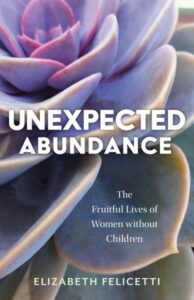 Unexpected Abundance: The Fruitful Lives of Women without Children Elizabeth Felicetti (Eerdmans) $16.99 OUR SALE PRICE = $13.59
Unexpected Abundance: The Fruitful Lives of Women without Children Elizabeth Felicetti (Eerdmans) $16.99 OUR SALE PRICE = $13.59
I do not have to say too much about this as the title explains so much. I’ll share that it is very well written, by a woman who is an Episcopal priest (at St. David’s Episcopalian in Richmond, VA.) She has written in venues such as The Christian Century and The Atlantic and, believe me, has some fine writing chops. Her love of the barren landscapes of the deserts of the Southwest — which give a fresh and new meaning to the word, “barren” — gives rise to writing that is delightfully lovely. But she’s shrewd, here, too, seriously deconstructing and reworking the phrase barren. It is a freighted Biblical word and she’s out to reclaim it. Wow.
Obviously (or so it should be) many women live extraordinary and splendid lives without bearing offspring. Some are happy with their reproductive choices while others are heartbroken with the struggles of infertility. Rev. Felicetti ponders why many in our culture — churched and otherwise, fundamentalist and progressive — seem uncomfortable about all this. She replays a conversion with a (liberally progressive, presumably) female bishop whose hurtful words shocked me. There is no doubt that women without children are seen in an odd light by many.
While reflecting on her own experiences, Pastor Felicetti explores “how childless women make vital contributions in their communities” It is as simple and as needful as that. Here you will meet twenty-five women who “generated life without giving birth.”
The chapters are intriguing, starting somewhat as expected with barren Old Testament matriarchs and New Testament Christians. She describes “barren medieval mystics and writers” and “two English reformers.” There is a chapter on “childless Christian composers’ and one on “childless Christian activists.” There’s a moving section on medical professionals and, naturally, one on childless clergy. In each she tells moving stories — it brought to mind old missionary anthologies I used to read — and in some she asks, bluntly, if they would have done such great things, or done them differently, if they had had children. It’s a fair question, curious, and, I’m guessing, finally, liberating for many who by choice (or through no choice of their own) have not borne children.
As a woman without children myself, I treasure the cloud of witnesses Felicetti has gathered together in this bold new book to attest to the abundant possibilities of a life aside from motherhood. What wonderful company we find ourselves in! Mary Magdalene, Clare of Assisi, Elizabeth I, Pauli Murray, Dolly Parton, and more. Unexpected Abundance will be a faithful and fierce companion for women who have chosen or are discerning this path. — Heidi Haverkamp, Episcopal priest and author of Everyday Connections: Reflections and Practices for Year B
Full of surprising blueprints both personal and historical, this book deftly flips the cultural script that conflates childlessness with something sad, bad, or less than and reminds us that flourishing has never followed a single plot. Even what we call barren bears life. — Erin S. Lane, author of Lessons in Belonging from a Church-Going Commitment Phone and Someone Other Than a Mother
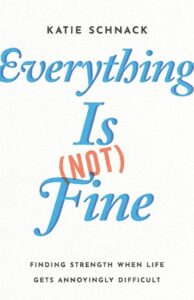 Everything Is (Not) Fine: Finding Strength When Life Gets Annoyingly Difficult Katie Schnack (IVP) $18.00 OUR SALE PRICE = $14.40
Everything Is (Not) Fine: Finding Strength When Life Gets Annoyingly Difficult Katie Schnack (IVP) $18.00 OUR SALE PRICE = $14.40
You know, for a book about hard times — “when the world knocks us flat on our butt” as it says on the back cover — this book is pretty darn enjoyable. Okay, it’s honest about some anguishing things, but there is an upbeat, even inspirational, feel to some of this. There is no sugarcoating (or “toxic positivity”) when searching for sustenance as she faced a child’s medical challenge and her own difficult season. As a starred review at Publishers Weekly put it, without much charm, her “honest rendering of faith challenges will help readers feel less alone, and her sense of humor added welcome moments of levity.” Oh yeah, there are moments of levity, many moments of levity. She is a character (and fine writer.) If you are young and in your twenties you may have read her The Gap Decade: When You’re Technically an Adult but Really Don’t Feel Like It.
I love the unit headings with titles like — “Don’t make it a thing until it’s a thing” and “Ghosts, messy T-Shirts, and chickens, because all these things totally make sense together.”
There are some great stories in here, offering advice like “make friendships with a firefighter who buys matching muumuus at Walmart with you” and “listen to your kid’s singing, even if it is obnoxious.” I like the chapter title that goes: “It might not get easier. Sorry. But! You can get used to it.” I wish I had maybe 30 years ago the chapter simply called “Chill Out About Parenting.”
So, this is fun, serious, wildly imaginative, funny, and at time grave about faithfulness in a broken, hurting world. I’m sure some of you are going to love this, especially if you’re the kind of person who calls their Starbucks drinks “Starbies.”
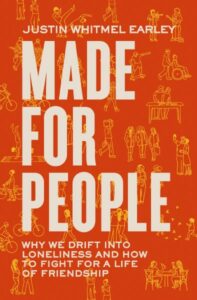 Made for People: Why We Drift Into Loneliness and How to Fight for a Life of Friendship Justin Whitmel Earley (Zondervan) $19.99 OUR SALE PRICE = $15.99
Made for People: Why We Drift Into Loneliness and How to Fight for a Life of Friendship Justin Whitmel Earley (Zondervan) $19.99 OUR SALE PRICE = $15.99
I hope you know Justin Earley’s amazing previous IVP book called Common Rule: Habits of Purpose in an Age of Distraction. (It was just re-issued in a slightly expanded edition with a new study guide.) It offers nice graphics and charts and nicely colored ink on creatively designed pages to show how there are things in our lives we need to do less of, and things we need to do more of, daily, weekly, monthly. It is one of the very few self-management books that makes sense to those of us with allergies to such stuff, and its design is a gift for those who like grids and charts to make things do-able. He roots his advice in theories of habits and desires and inner transformation, even as he offers right-on, whole-life advice about Christian maturity. The book is very wise blast.
The second one applied much of this same approach and writerly energy (and nice design) to family life, parenting and whatnot. It was called Habits of the Household and, again, is simply stellar, useful, fun. Give it to any young parents you know!
This brand new one seems to carry a similar edge and elan, written with energy and honesty (and some multi-colored ink on the cleverly designed pages, complete with line drawings and cartoons.) What fun.
The Made for People book, however, is not cheesy nor simplistic, and the topic is deadly serious. It is, as Kyle Idleman put it, “a clarion call to covenant friendship — a deep abiding love that comes from vulnerability.”
Loneliness has become a cultural epidemic and it literally affects the health and happiness of millions. As it says on the back cover, “busyness, fear of vulnerability, and past pain often stop us from developing the deep friendships we long for. But it’s not supposed to be this way. You were made for people.”
God has made us in God’s own Triune image as people to be in relationship. We, these days, for various reasons, need to relearn key habits that “foster a lifestyle of friendship.” Isolation is not helpful and it need not be the story of our lives. Earley — a busy dad and business lawyer — has a lot to tell and a lot to teach. Just the table of contents is inspiring. I’m going to check it out. Maybe you should start a group to read it together, folks who might deepen in Biblical wisdom for deeper relationships.
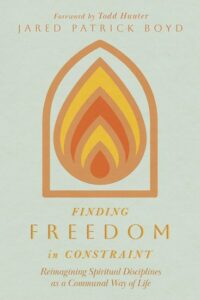 Finding Freedom in Constraint: Reimagining Spiritual Disciplines as a Communal Way of Life Jared Patrick Boyd (formatio / IVP) $20.00 OUR SALE PRICE = $16.00
Finding Freedom in Constraint: Reimagining Spiritual Disciplines as a Communal Way of Life Jared Patrick Boyd (formatio / IVP) $20.00 OUR SALE PRICE = $16.00
From the publishing partnership with the Order of the Common Life to the exciting forward by Bishop Todd Hunter (and the stellar endorsements by Episcopalian Bible prof Wesley Hill and Anglican priest and writer Tish Harrison Warren) I knew this was going to be a very special book. I spent hours with it on Sunday and will take it up contemplatively next Lord’s Day, I am sure. It is stunning.
Speaking of relationships (see Made for People, above) Boyd insists that this book must be read with others. He encourages us to find fellow readers, begs us to comply; I get it. He is right. We have privatized and personalized the spiritual practices that make for a rich interior life way too much, and we need the local church (or at least a small group of like-minded pilgrims) to walk the way of spiritual formation with us. He’s right, but whether you have reading companions and conversation partners or not, this book is a rewarding, rich, compelling read.
Finding Freedom in Constraint is, in many ways, a “next level” book if one is familiar with the writings of the likes of Richard Foster or Ruth Haley Barton or Dallas Willard or David Benner; he loves citing Thomas Merton, Roberta Bondi, Thomas Greene, and the like. He draws on ancient church writers (especially the early church mothers and fathers of the desert) and helps us reimagine how all that works in our own lives. He offers intriguing history of the rise of monasticism and the way of life that ensued… He tells contemporary stories and shares much about his own journey. It’s a great read.
Jared is sensitive to those who have been hurt by the church and invites even those who are skeptical into this freedom-seeking life of constraint. He’s been down the road of deconstruction a bit, I gather, not unaware of issues looming large for some. I appreciate his tone and his general direction.
Here’s the big thing, as you can tell from the title. He believes that spiritual disciplines, when practiced together, are enriching even if they teach us to live within limits. To submit, to surrender, to be constrained. I wish he explained exactly what that means early on, but that is part of the fun, reading eagerly, hoping it is fleshed out and made more clear, as it seems to be, chapter by chapter. Will we limit ourselves and thereby be opened up to “make greater room to experience the love of God”? As Wes Hill puts it, it will be for many “a welcome challenge and summons to a holistic encounter with God in Christ.”
Jared Patrick Boyd is a pastor in the Vineyard USA movement and the founder of a missional monastic order, helping think through the nature of religious vocation and calling in our era. He also wrote the tremendous, tremendous book about praying with children and mentoring them into a deeper life called Imaginative Prayer: A Yearlong Guide for Your Child’s Spiritual Formation.
(By the way, while Boyd writes, it seems, to a somewhat younger crowd and those experimenting with new forms of liturgical church and spiritual formation groups, the type font in this book is a nicely readable size, a tad bigger than some. For those needing a bit of help in this area, Finding Freedom in Constraint is a readable choice.)
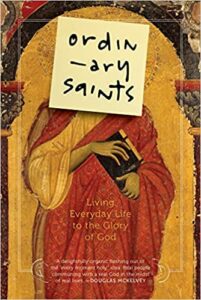 Ordinary Saints: Living Every Day to the Glory of God edited by Ned Bustard (Square Halo Books) $24.99 OUR SALE PRICE = $19.99
Ordinary Saints: Living Every Day to the Glory of God edited by Ned Bustard (Square Halo Books) $24.99 OUR SALE PRICE = $19.99
May I suggest this yet again. It came out a few months back and while I did a major BookNotes review, I’m still so fond of it and find myself dipping in over and over. There are bunch of chapters by bunches of people — some who are extraordinary writers, some rather famous, most not, though — and each just shares a short, creatively written piece about how they honor God in their ordinary lives. Each one picks a certain thing, a side of life or thing they do, and explains how, in God’s gracious economy, this thing matters.
As I’ve said before here at BookNotes there are fun chapters. There are inspiring essays on roller skating, raising chickens, drinking wine, doing home repairs. Most readers will enjoy the chapter about going to museums and some will get a kick of the piece on knitting (written by poet Luci Shaw.) Can you dance to the glory of God? Does God care about your choice of briefcase? Hooray for a theologically-informed celebration of comic books. Who knew reading about napping would be so fun. The small talk chapter is a great one. Malcolm Guite even has a piece on smoking pipes.
There are harder things here, too — there is a candid chapter about mental illness, one on grief, one on the sadnesses (among the joys) of grand parenting. There is a God-honoring chapter on resisting porn. The piece on “graying” is good.
Some are not quite funny, but not about hardships. Calvin Seerveld has one on a Biblically-informed way to talk about knowing. Curt Thompson has a really good piece on being present to others. I have one about working in retail. I will forever be touched by Ned Bustard’s piece on making love, knowing that his wife, Leslie, is now awaiting the full resurrection and restoration all things, in love.
From a nice piece on mentoring others to a good introduction to the joy of movies, from Bruce Herman on painting to a nice entry on writing, Ordinary Saints is a treasure chest full of enjoyment and, importantly, examples of, well, ordinary saints. Soli de Gloria, even if you don’t strap on those roller skates.
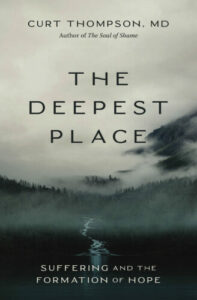 The Deepest Place: Suffering and the Formation of Hope Curt Thompson (Zondervan) $27.00 NOT YET RELEASED – DUE AUGUST 29, 2023 // OUR PRE-ORDER SALE PRICE = $22.39
The Deepest Place: Suffering and the Formation of Hope Curt Thompson (Zondervan) $27.00 NOT YET RELEASED – DUE AUGUST 29, 2023 // OUR PRE-ORDER SALE PRICE = $22.39
This may soon become one of the most talked about books of the fall, in the religious book marketplace, at least, and should be one of the most anticipated. It comes out in a few weeks or so, but, alas, my fear is that it may not be widely known that it is coming soon. Dr. Curt is a hero for many of us, an articulate, polished, honest, teacherly psychotherapist who has the knack of being able to write profound, serious works that are upbeat, clear-headed, and accessible. He is Biblically-wise and exceptionally thoughtful, theologically informed as he is. We so appreciated his debut release The Anatomy of a Soul, raved about his exceptional sophomore volume,The Soul of Shame: Retelling the Stories We Believe about Ourselves (the best Biblically-informed psychological study of the topic I’ve ever read) and was very deeply moved by his seriously lovely third one, The Soul of Desire: Discovering the Neuroscience of Longing, Beauty, and Community. (Mako Fujimura wrote a splendid forward for that one.) The last two were expertly done in hardcover by IVP and they remain essential volumes.
This new one is on a topic that has been mined deeply and covered well — the problem of suffering and the hope for resilience. I almost wondered what even Curt might bring to this well-worn conversation. Could he add something new? I am half way through this extraordinary book and I am sure there is little done that does what this book accomplishes. Who knew that such a standard topic could be so very interesting and how this uniquely Christian approach to neuro-psychology and “interpersonal neurobiology” (IPNB) would be so enlightening. Wow.
There is good Bible study in here, there is provocative, solid theologizing, there is awareness of deep and personal suffering, all woven around themes of how to find hope, rather than despair, how to move through grief, and how God uses it, forming it some sort of redemptive peace. I hesitate to even say that, as it can be exploitive and debilitating, but in Curt’s empathic and experienced hands, hope is within reach — formed in community! — and, through certain sorts of perseverance, can change our brains and reshape our imagination. The Deepest Place builds a slow case, carefully, clearly, delightfully, even.
We can live into a better future, through a faithful understanding of the nature of suffering, some profound Biblical insight (especially from the first few verses of Romans 5 that he unpacks nicely) and help from tools gleaned from attachment theory, neural social engagement systems, EMDR, and the work of scholars such as Daniel Siegel and Bessel van der Kolk. This work is as fascinating as it is helpful.
Seeing Siegel, van der Kolk, and Brene Brown in conversation with the likes of John Goldingay, N.T. Wright and Lesslie Newbigin, is a sheer delight. This book is a stand-out, an instant classic in how it models a fruitful integration of faith and scholarship, and how it offers durable hope for real folks. Curt Thompson’s work is always very highly recommended and this is one of his most urgent. Due out sometime the end of August (but one never knows with this publisher, I must say.) Pre-order it now at our discounted price and we’ll send it the day it comes.
+++
TO PLACE AN ORDER
PLEASE READ, THEN SCROLL DOWN AND CLICK ON THE “ORDER HERE” LINK BELOW.
It is very helpful if you tell us how you prefer us to ship your orders.
The weight and destination of your package varies but you can use this as a quick, general guide:
There are generally two kinds of US Mail options, and, of course, UPS. If necessary, we can do overnight and other expedited methods, too. Just ask.
- United States Postal Service has the option called “Media Mail” which is cheapest but can be slow. For one typical book, usually, it’s about $3.85; 2 lbs would be $4.55.
- United States Postal Service has another option called “Priority Mail” which is $8.50, if it fits in a flat rate envelope. Many children’s books and some Bibles are oversized so that might take the next size up which is $9.20. “Priority Mail” gets much more attention than does “Media Mail” and is often just a few days to anywhere in the US.
- UPS Ground is reliable but varies by weight and distance and may take longer than USPS. We’re happy to figure out your options for you once we know what you want.
If you just want to say “cheapest” that is fine. If you are eager and don’t want the slowest method, do say so. It really helps us serve you well so let us know. Just saying “US Mail” isn’t helpful because there are those two methods, one cheaper but slower, one more costly but quicker. Which do you prefer?
BookNotes
SPECIAL
DISCOUNT
20% OFF
ALL BOOKS MENTIONED
+++
order here
this takes you to the secure Hearts & Minds order form page
just tell us what you want to order
inquire here
if you have questions or need more information
just ask us what you want to know
Hearts & Minds 234 East Main Street Dallastown PA 17313
read@heartsandmindsbooks.com
717-246-3333
Sadly, as of July 2023 we are still closed for in-store browsing. COVID is not fully over. Since few are reporting their illnesses anymore, it is tricky to know the reality but the best measurement is to check the waste water tables to see the amount of virus in the eco-system. It is bad; worse than it was two years ago, even. It’s important to be aware of how risks we take might effect the public good as those at risk, while not dying from the virus, are experiencing long-term health consequences. (Just check the latest reports of the rise of heart attacks and diabetes among younger adults, caused by Covid.) It is complicated, but we are still closed for in-store browsing due to our commitment to public health (and the safety of our family, staff, and customers.) The vaccination rate here in York County is sadly lower than average. Our store is a bit cramped without top-notch ventilation, so we are trying to be wise.
We will keep you posted about our future plans… we are eager, but delayed, for now.
We are doing our famous curb-side and back yard customer service and can show any number of items to you if you call us from our back parking lot. It’s sort of fun, actually. We are eager to serve and grateful for your patience as we all work to mitigate the pandemic. We are very happy to help, so if you are in the area, do stop by. We love to see old friends and new customers.
Of course, we’re happy to ship books anywhere.
We are here 10:00 – 6:00 EST / Monday – Saturday. Closed on Sunday.

